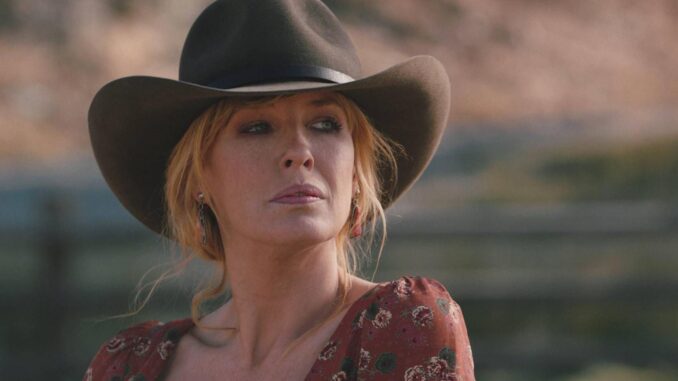
The Bitter Harvest of Beauty: Kelly Reilly's Prophecy for the Yellowstone Finale
The sprawling Montana landscape, a canvas of emerald forests, snow-capped peaks, and endless, unforgiving skies, has long been the silent, majestic witness to the Dutton saga. For five seasons, Yellowstone has carved a primal, often brutal, narrative into the American consciousness, a story of land, legacy, and the relentless fight to preserve a vanishing way of life. As the final act looms, the anticipation is a palpable thing, thick with the scent of pine and gunpowder. It is into this charged atmosphere that Kelly Reilly, the incendiary force of nature known as Beth Dutton, offers a prophecy as sharp and poignant as any delivered by a sagebrush prophet: the finale will be "beautiful and epic," but she's "not sure it’ll be happy." Her words aren't just a teaser; they are a profound distillation of the show's very essence, an illustrative echo of the inherent paradox at the heart of the Dutton dynasty.
The "beautiful and epic" aspect of the Yellowstone finale needs little conjecture. From its cinematic scope to its operatic emotional swings, the series has consistently delivered grandeur. We anticipate scenes of breathtaking visual splendor: horses thundering across open plains, the vastness of the Yellowstone ranch stretching to the horizon, the silent, knowing gaze of a thousand-year-old mountain witnessing the struggles of mere mortals. The "epic" will undoubtedly reside in the scale of the conflict. This isn't just a battle for a ranch; it's a war for a way of life, a clash between tradition and progress, between freedom and ownership, between the call of the wild and the encroachment of civilization. Every character, from the stoic patriarch John Dutton to the fiercely loyal Rip Wheeler, has been a player in a high-stakes game where the very ground beneath their feet is the ultimate prize. The finale promises to be a crucible, forging the destinies of these characters in a final, explosive conflagration, a fittingly dramatic end to a saga steeped in blood and dirt.
Yet, it is Reilly's qualification – the stark "not sure it’ll be happy" – that truly illuminates the soul of Yellowstone. Happiness, in the conventional sense, has always been a shimmering mirage on the Dutton horizon, a fleeting moment of peace swallowed by the insatiable demands of the ranch. The beauty of their world is often intertwined with its brutality; the freedom it offers comes at the price of constant vigilance and frequent violence. The Duttons are not characters who walk away unscathed; they are defined by their scars, by the ghosts of those they've lost, and by the unforgiving choices they've made to protect their empire.
Consider Beth herself, a phoenix risen from the ashes of her own making, whose love for Rip is as fierce and protective as her hatred for Jamie is venomous. Her journey has been a masterclass in controlled chaos, a testament to the idea that profound love can coexist with unimaginable pain. For Beth, and indeed for all the Duttons, happiness isn't a warm, fuzzy feeling; it's a momentary reprieve from the storm, a quiet evening on the porch before the next wave breaks. Her understanding of life is too pragmatic, too deeply etched with loss and betrayal, to expect a neat, saccharine conclusion.
The "unhappy" ending she hints at speaks to the core thematic truth of the series: that holding onto such an immense legacy, especially one built on ancestral claim and violent defense, extracts an unbearable toll. It suggests that the price of securing the Yellowstone ranch might be greater than any individual can pay. This could manifest in sacrifice, in the loss of beloved characters, or in a victory so costly it feels like defeat. It could also mean an ending where the cycle of violence isn't broken, merely paused, leaving a bittersweet taste that resonates with the show's unflinching realism. Yellowstone has never shied away from showing the ugly side of love, family, and power. It has consistently demonstrated that the most breathtaking beauty can be found in the most heartbreaking sacrifice.
Kelly Reilly's insightful words serve as a compass for the devoted viewer, guiding our expectations away from simplistic closure and towards a more profound, more authentic conclusion. The Yellowstone finale will be a visceral experience, undoubtedly painted with the broad, majestic strokes that define its visual identity and the epic conflicts that have driven its narrative. But it is in the absence of conventional happiness, in the enduring echo of pain and sacrifice, that its true artistry will likely reside. It will be beautiful because it is honest, epic because it is human, and perhaps, all the more impactful because its "happy" ending remains as elusive as the wild spirit of Montana itself. We are being prepared not for a celebration, but for a solemn, perhaps cathartic, and undeniably unforgettable farewell.
